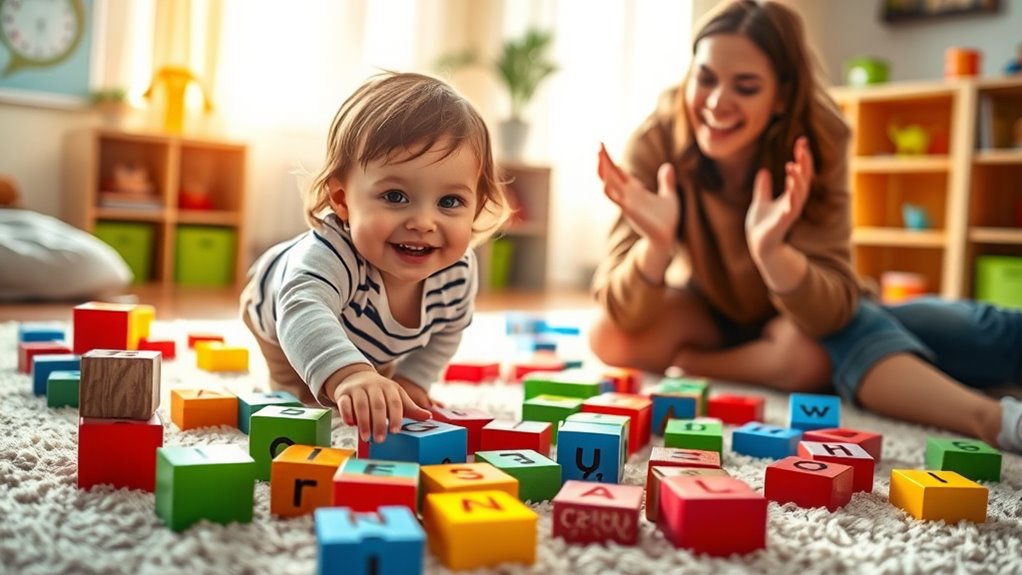Playing word games that make your toddler laugh is a fun way to boost their language skills. Simple rhymes, silly sounds, and puns help them recognize patterns, expand vocabulary, and build confidence. Laughter connects you and encourages your child to try new words without fear. By including humor in daily interactions, you’ll see their social and emotional skills grow too. Keep exploring, and you’ll discover even more ways to make learning a joyful experience.
Key Takeaways
- Incorporate rhyming and pun games to boost vocabulary and sound pattern recognition in toddlers.
- Use playful sound games to develop phonemic awareness and make language learning enjoyable.
- Engage in wordplay activities that encourage toddlers to try new words, building confidence and speech skills.
- Observe children’s humorous attempts to mimic rhymes or invent funny words to support their language development.
- Integrate humor into daily interactions to foster a joyful, relaxed environment that promotes active language use.

Have you ever noticed how laughter can bridge language barriers and reveal shared understanding? It’s a powerful tool, especially when it comes to helping your toddler learn to communicate. When you engage in wordplay activities, you create a fun, relaxed environment that encourages your child’s humor development and language skills to flourish. These activities aren’t just silly games; they’re essential building blocks for your child’s future conversations and connections.
Wordplay games are simple yet effective ways to boost your toddler’s vocabulary and grasp of language patterns. Think about playing with rhymes, puns, or silly sounds—things that make both of you giggle. For example, rhyming games like “Can you say ‘cat’ and then rhyme it with ‘hat’?” help your child recognize sound patterns and develop phonemic awareness. When you turn these activities into playful challenges, your toddler begins to see language as a source of joy rather than just a set of rules. This naturally promotes humor development because they start to understand that language can be funny and surprising.
Playing rhyming and silly sound games helps toddlers see language as fun and full of surprises.
Engaging in wordplay also encourages your child to experiment with sounds and words without the pressure of perfect pronunciation. They’ll try out new words, stumble over silly phrases, and laugh at their own mistakes—all of which are vital steps in language acquisition. Your playful reactions and shared laughter reinforce their efforts, making the learning process feel like a game rather than a chore. When your toddler sees that language can be funny, they’re more inclined to participate actively, which accelerates their speech development and confidence.
Additionally, understanding the impact of UV exposure from tanning beds and outdoor sun can help you teach your child about healthy skin habits early on. Moreover, these activities help you observe your child’s evolving understanding of language. Notice the moments when they mimic rhymes or invent their own funny words—these are signs they’re grasping language’s playful potential. By incorporating humor into your daily interactions, you’re nurturing their humor development, which is closely linked to social skills and emotional intelligence. When your child learns that language can bring smiles and laughter, they become more enthusiastic to communicate and connect with others.
Frequently Asked Questions
When Should I Start Introducing Wordplay Games to My Toddler?
You should start introducing wordplay games to your toddler around 12 months, as it aligns with early language milestones. Engaging toddler activities like simple rhymes and word games boost their vocabulary and communication skills. These activities are fun and interactive, encouraging your child to experiment with sounds and words. The sooner you begin, the more natural language development becomes, setting a strong foundation for future speech and social skills.
Are There Any Words or Topics to Avoid During Play?
This question is essential because words can be like tiny seeds that grow into lasting impressions. You should avoid inappropriate topics and sensitive words during play, as they can cause confusion or upset your toddler. Stick to appropriate topics, fun sounds, and simple words. Keep the conversation positive and age-appropriate, ensuring your child feels safe and excited to learn. Remember, your words shape their understanding of the world!
How Can I Adapt Games for Children With Speech Delays?
To adapt games for children with speech delays, you can use visual aids to support understanding and engagement. Simplify your vocabulary, speaking slowly and clearly, to make words easier for them to imitate. Focus on short, fun activities that encourage communication without pressure. Incorporate gestures and facial expressions to reinforce words, helping your child connect sounds with meanings and build confidence during play.
What Are Signs My Toddler Is Ready for More Complex Wordplay?
Think of your toddler as a sponge ready to soak up new ideas. When they begin recognizing rhymes and trying to use more varied words, they’re showing signs they’re ready for more complex wordplay. You’ll notice their vocabulary expands, and they might start playing with sounds or words, indicating increased confidence. These signs mean it’s a great time to introduce fun activities focused on rhyming recognition and expanding their language skills.
Can These Activities Help With Bilingual Language Development?
These activities can definitely help with bilingual language development. They encourage your toddler to practice bilingual code switching and enhance their understanding of language immersion techniques. By engaging in playful word games, your child will naturally pick up both languages, improve their vocabulary, and develop better communication skills. Plus, the fun environment makes learning enjoyable, motivating your toddler to become more confident in using both languages daily.
Conclusion
By incorporating wordplay games into your daily routine, you not only make learning fun but also support your toddler’s language development. Some experts believe that laughter and play activate neural pathways that reinforce memory and understanding, making language acquisition more effective. So, as you share these playful moments, remember you’re fostering a joyful, interactive environment that encourages your child’s communication skills to flourish naturally. After all, a little laughter truly goes a long way in building a strong language foundation.










